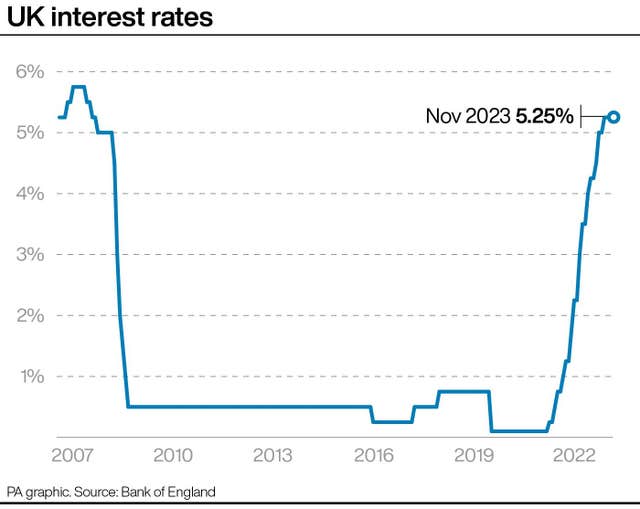
The Bank of England is expected to hold interest rates for the third time in a row, as fresh data has pointed towards potential cracks in the economy.
On Thursday, the Bank of England’s Monetary Policy Committee (MPC) will meet for the final time this year to vote on interest rates – which help dictate mortgage rates set by banks.
The central bank had hiked interest rate in 14 consecutive meeting until they peaked at a 15-year high of 5.25%.
 PA Graphics
PA Graphics
Rate setters from the bank had increased borrowing costs to put pressure on consumer spending in order to bring down inflation.
However, the MPC held rates in the September and November meetings after witnessing a notable cooling in the rate of inflation.
The latest meeting comes after key economic data from the Office for National Statistics (ONS) this week also showed signs of cooling in the economy.
On Wednesday, the ONS said UK gross domestic product (GDP) fell 0.3% in October, as the manufacturing and construction sectors were impacted by poor weather.
READ MORE: UK interest rates focus as economy stagnates, recession fear
It came a day after the statistics body revealed that wage growth slowed at the fastest pace for two years.
The ONS said private sector regular earnings, excluding bonuses, rose by 7.3% in the three months to October, down from 7.8% in the previous three months, pointing towards weakening in the labour market.
Economists have increased their expectations for the interest rate cuts next year as a result.
GDP was flat (0.0% growth) in the three months to October.
In the month of October, GDP fell 0.3%.
➡️ https://t.co/k1USftqo5r pic.twitter.com/OUdm9sRpaO
— Office for National Statistics (ONS) (@ONS) December 13, 2023
Previously, the financial markets had priced in 0.75 percentage points of interest rate cuts in 2024, but on Wednesday they were expecting a 1 percentage point drop, which would take interest rates to 4.25% by the end of 2024.
Nevertheless, experts are still expecting rates to remain steady in Thursday’s vote and in the early months of the New Year.
Martin Beck, chief economic advisor to the EY Item Club, said little has changed since the previous rate decisions – held in September and November – to bring about a different result.
“December’s MPC meeting will almost certainly prove the third in succession to deliver no change in interest rates,” he said.
“There’s been nothing in the way of significant economic surprises over the last four weeks and inflation and pay growth have slowed (the former by more than the Bank of England expected).”
The Bank of England has remained cautious about rate cuts despite signs of cooling inflation and subdued economic activity in recent data.
READ MORE: Watchdog warns of stubborn high inflation and interest rates
The Bank’s governor, Andrew Bailey, and other member of the MPC, have indicated rates will remain where they are for some time.
At Parliament’s Treasury Committee last month, Mr Bailey suggested the threat of UK inflation is being underestimated and said the Bank is still focused on concerns over persistent inflation.
He indicated that inflation in the services sector, where most Britons spend their money, is likely to remain at around 6% through the start of 2024.
James Smith, developed markets economist at ING, said he therefore expects the Bank to reiterate this message.
He said: “Markets are pricing three rate cuts in 2024 and we doubt the Bank will be too happy about that.
“Expect policymakers to reiterate that rates need to stay restrictive for some time.
“We only get a statement and minutes on Thursday, and no press conference or forecasts, so the opportunity to shift the messaging is fairly limited.”
The Bank of England has also warned that nearly a million people could see mortgage repayments soar by more than £500 a month by the end of 2026 as pressure from higher rates continues to feed into the economy.



Why are you making commenting on The Herald only available to subscribers?
It should have been a safe space for informed debate, somewhere for readers to discuss issues around the biggest stories of the day, but all too often the below the line comments on most websites have become bogged down by off-topic discussions and abuse.
heraldscotland.com is tackling this problem by allowing only subscribers to comment.
We are doing this to improve the experience for our loyal readers and we believe it will reduce the ability of trolls and troublemakers, who occasionally find their way onto our site, to abuse our journalists and readers. We also hope it will help the comments section fulfil its promise as a part of Scotland's conversation with itself.
We are lucky at The Herald. We are read by an informed, educated readership who can add their knowledge and insights to our stories.
That is invaluable.
We are making the subscriber-only change to support our valued readers, who tell us they don't want the site cluttered up with irrelevant comments, untruths and abuse.
In the past, the journalist’s job was to collect and distribute information to the audience. Technology means that readers can shape a discussion. We look forward to hearing from you on heraldscotland.com
Comments & Moderation
Readers’ comments: You are personally liable for the content of any comments you upload to this website, so please act responsibly. We do not pre-moderate or monitor readers’ comments appearing on our websites, but we do post-moderate in response to complaints we receive or otherwise when a potential problem comes to our attention. You can make a complaint by using the ‘report this post’ link . We may then apply our discretion under the user terms to amend or delete comments.
Post moderation is undertaken full-time 9am-6pm on weekdays, and on a part-time basis outwith those hours.
Read the rules here